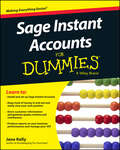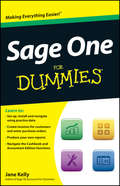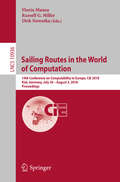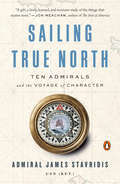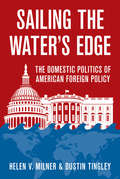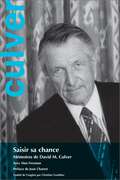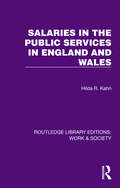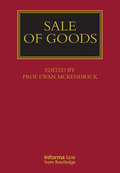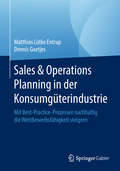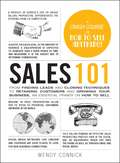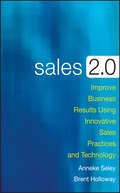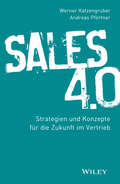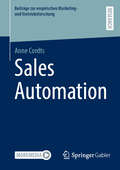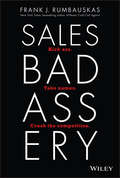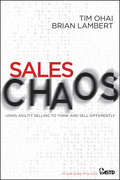- Table View
- List View
Sage Instant Accounts For Dummies
by Jane E. KellyGet to grips with Sage Instant Accounts in simple steps. This comprehensive guide walks you through every aspect of setting up and using Sage Instant Accounts, from downloading and installing the software to customizing it to your needs. Packed with handy step–by–step instructions (and fully illustrated with screenshots), this book is the easiest way to get the most from Sage Instant Accounts and take control of your business finances. Learn to: Keep track of money in and out and easily view your cash position Produce reports on your business performance and profitability Store customer information and easily generate quotes, invoices and remittances Record and accurately manage your VAT - and submit your VAT return to HMRC online Prepare for business audits and your financial year-end
Sage One For Dummies
by Jane KellyGet to grips with Sage One in simple steps.Sage One For Dummies explains every aspect of setting up and navigating Sage One, the newest accounting solution for small businesses and sole traders. It includes clear instructions for using Sage One Accounts including setting up customer and supplier records, creating invoices, paying customers and suppliers, bank reconciliation, VAT returns and reporting. It also explains how to use the Cashbook function (if your business is more cash-based) and how to work with your accountant using the Accountant Edition. Packed with step-by-step instructions and fully illustrated with screenshots, this book is the easiest way to get the most from Sage One and take control of your business finances.Shows readers how to set up, install and navigate using dummy dataFeatures setting up customer & supplier recordsDetails how to create invoices for customers and suppliersEnables the reader to produce their own reports
Sage V Foods and Element Farms: Preparing for the Future of Controlled Environment Agriculture
by Rachel Lee Ray A. Goldberg Canning MalkinCase
Saginaw Parts Co. and the General Motors Corp. Credit Default Swap
by William E. FruhanThis two-page case demonstrates how to unbundle the cost of credit extensions from product prices by observing the price of a credit default swap. It also explores how credit default swaps work, and how trade creditors are treated under U.S. bankruptcy law. Finally it provides a quick overview of the bankruptcy of General Motors Corp.
Saham Group: It's in the Genes
by Gamze Yucaoglu Christina R. WingThe case opens in August 2020 as Moulay Mhamed Elalamy (Mhamed), CEO of the Saham Group (the Group), a pan-African investment company that operates a variety of businesses out of Morocco, contemplates the Group's identity, its investment strategy, and how to navigate the existing businesses through volatility. Since Mhamed's father Moulay Hafid Elalamy (Moulay Hafid) had laid the foundations of the Group in 1995, its insurance arm became the largest insurance company in Morocco and expanded into the rest of Africa, and the Group diversified to include call centers, real estate, and agriculture. In 2013, Moulay Hafid Elalmy left his executive duties to take on the role of Minister of Industry, Trade, and New Technologies. The case talks about Mhamed's entering the family business at the age of 23 and his rise through the ranks to eventually assume the CEO position. In 2018, Mhamed decided to sell the insurance businesses, the Group's crown jewel, and the Group became a private equity house. Since then, Mhamed and his sister Anissa Elalamy were focused on making sure that business continued to prosper. While the Group was settling into its new identity as a family office focused on private equity, the COVID-19 pandemic highlighted the difference between the father and son's risk appetite and management styles: Mhamed was focused on value preservation and risk-reward analysis, while Moulay Hafid's saw opportunities everywhere. This raised questions for the future and the family contemplated its risk tolerance and allocation, governance, and succession. The case introduces the different family members and executives and their points of view and asks: What difficult conversations did the Elalamys need to have to ensure shareholder value and continued success in the upcoming generations?
Sailing Routes in the World of Computation: 14th Conference on Computability in Europe, CiE 2018, Kiel, Germany, July 30 – August 3, 2018, Proceedings (Lecture Notes in Computer Science #10936)
by Florin Manea Dirk Nowotka Russell G. MillerThis book constitutes the refereed proceedings of the 14th Conference on Computability in Europe, CiE 2018, held in Kiel, Germany, in July/ August 2017.The 26 revised full papers were carefully reviewed and selected from 55 submissions. In addition, this volume includes 15 invited papers. The conference CiE 2018 has six special sessions, namely: Approximation and optimization, Bioinformatics and bio-inspired computing, computing with imperfect information, continuous computation, history and philosophy of computing (celebrating the 80th birthday of Martin Davis), and SAT-solving.
Sailing True North: Ten Admirals and the Voyage of Character
by Admiral James StavridisFrom one of the most distinguished admirals of our time and a former Supreme Allied Commander of NATO, a meditation on leadership and character refracted through the lives of ten of the most illustrious naval commanders in historyIn his acclaimed book Sea Power, James Stavridis reckoned with the history and geopolitics of the world's great bodies of water. Now in Sailing True North, he offers a much more intimate, human accounting: the lessons of leadership and character contained in the lives and careers of history's most significant naval commanders. Admiral Stavridis brings a lifetime of reflection to bear on the subjects of his study--on naval history, on the vocation of the admiral with its special tests and challenges, and on the sweep of global geopolitics. Above all, this is a book that will help you navigate your own life's voyage: the voyage of leadership of course, but more important, the voyage of character. Sadly, evil men can be effective leaders sailing toward bad ends; ultimately, leadership without character is like a ship underway without a rudder. Sailing True North helps us find the right course to chart.Simply as epic lives, the tales of these ten admirals offer up a collection of the greatest imaginable sea stories. Moreover, spanning 2,500 years from ancient Greece to the twenty-first century, Sailing True North is a book that offers a history of the world through the prism of our greatest naval leaders. None of the admirals in this volume were perfect, and some were deeply flawed. But from Themistocles, Drake, and Nelson to Nimitz, Rickover, and Hopper, important themes emerge, not least that there is an art to knowing when to listen to your shipmates and when to turn a blind eye; that serving your reputation is a poor substitute for serving your character; and that taking time to read and reflect is not a luxury, it's a necessity.By putting us on personal terms with historic leaders in the maritime sphere he knows so well, James Stavridis has in Sailing True North offered a compass that can help us navigate the story of our own lives, wherever that voyage takes us.
Sailing the Water's Edge
by Helen V. Milner Dustin TingleyWhen engaging with other countries, the U.S. government has a number of different policy instruments at its disposal, including foreign aid, international trade, and the use of military force. But what determines which policies are chosen? Does the United States rely too much on the use of military power and coercion in its foreign policies? Sailing the Water's Edge focuses on how domestic U.S. politics--in particular the interactions between the president, Congress, interest groups, bureaucratic institutions, and the public--have influenced foreign policy choices since World War II and shows why presidents have more control over some policy instruments than others. Presidential power matters and it varies systematically across policy instruments.Helen Milner and Dustin Tingley consider how Congress and interest groups have substantial material interests in and ideological divisions around certain issues and that these factors constrain presidents from applying specific tools. As a result, presidents select instruments that they have more control over, such as use of the military. This militarization of U.S. foreign policy raises concerns about the nature of American engagement, substitution among policy tools, and the future of U.S. foreign policy. Milner and Tingley explore whether American foreign policy will remain guided by a grand strategy of liberal internationalism, what affects American foreign policy successes and failures, and the role of U.S. intelligence collection in shaping foreign policy. The authors support their arguments with rigorous theorizing, quantitative analysis, and focused case studies, such as U.S. foreign policy in Sub-Saharan Africa across two presidential administrations.Sailing the Water's Edge examines the importance of domestic political coalitions and institutions on the formation of American foreign policy.
Sailors, Slaves, and Immigrants
by Alessandro StanzianiSlaves, convicts, indentured immigrants, and unfree seamen have traveled the world's oceans at many times and places throughout human history. Across the Atlantic, Mediterranean, Indian, and Pacific Oceans, this bondage took divergent forms and exhibited a range of historical dynamics. In spite of this variety, the conventional Atlantic World historical paradigm has largely shaped our understanding of modernity as being defined by exploration and discovery, European dominance, global capitalism, and the transition from slavery to free labor. Not only does this perspective evince a Eurocentric emphasis on the 'uniqueness' of the West, but it is increasingly contested even for the Atlantic itself. This provocative study contrasts the romantic conflation of freedom and the sea with the complex labor relationships of seamen, slaves, and immigrants in the Indian Ocean during the long nineteenth century. In the process, it advances a new framework for understanding labor, bondage, and modernization.
Saint-Simonians in Nineteenth-Century France
by Pamela PilbeamSaint-Simonians were a group of young engineers and doctors who proposed original solutions to the social and banking crises of the early nineteenth century. Through an examination of the lives, ideals and activities of these men and women, the book analyses the influence of the Saint-Simonians on nineteenth-century French society.
Saisir sa chance: Mémoires de David M. Culver (Biographies et mémoires)
by Alan Freeman David M. CulverDavid Culver, figure clé tant du milieu des affaires que du milieu culturel canadien, raconte son enfance à Montréal, ses études aux universités McGill et Harvard et son service militaire pendant la Deuxième Guerre mondiale. Il décrit surtout sa spectaculaire ascension au sein d’Alcan, jusqu’à accéder au poste de président-directeur général, devenant du coup le chef d’une des plus grandes sociétés multinationales du Canada, dont le siège social était à Montréal. Ces mémoires lèvent le voile sur la gestion d’une multinationale bien enracinée en sol québécois. Il propose des conseils pragmatiques sur la manière de cultiver le talent, développer la technologie et surmonter les défis au sein d’une entreprise qui opère aux quatre coins de la planète. Au fil de délicieuses anecdotes et d’inoubliables rencontres avec des grands du XXe siècle – dont Margaret Thatcher, Henry Kissinger et Jawaharlal Nehru – David Culver se révèle un imposant leader aux intérêts et aux talents multiples. Dans ses mémoires, David Culver médite sur sa passion pour l’architecture – et ses initiatives de protection du patrimoine montréalais par l’entremise de la Maison Alcan – et l’importance de la musique et du sport dans sa vie. Saisir sa chance témoigne de l’optimisme de Culver, qui a de tout temps cru que les choses les plus extraordinaires peuvent arriver lorsqu’on s’y attend le moins. Publié en français
Salaries in the Public Services in England and Wales (Routledge Library Editions: Work & Society)
by Hilda R. KahnOriginally published in 1964, at a time of much public unease regarding redundancy, this book contains the results of a comprehensive survey, inspired by a suggestion of the then Minister of Labour that the mass redundancies in the Midlands motor industry of 1956 merited a full-scale investigation. The findings are based on an analysis of a 1 in 10 sample of men made redundant in Birmingham in the period. Among the matters examined are the difficulties encountered in obtaining work after redundancy; the range of geographical mobility and the role played by the then employment exchanges in securing new employment. Other chapters focus on the financial hardship caused; the resort to savings and the impact of the redundancies on the gender balance in the workforce. The impact of the dismissals on trade union affiliation is also considered, as are the men’s verdicts on the ‘fairness’ of the selection procedure adopted.
Salary Finance
by John R. Wells Benjamin WeinstockIn April 2019, Asesh Sarkar, co-founder and chief executive of Salary Finance Limited, a London-based FinTech, faced tough choices. Sarkar had founded Salary Finance with Dan Cobley and Daniel Shakhani in 2015. The company's value proposition was quite simple: partner with employers to offer employees affordable loans that were repaid through automatic payroll deductions. Taking repayments directly from salary, and collecting those repayments in one transaction from the employer, dramatically reduced costs, saving employees large amounts of interest when compared to market alternatives like credit cards or payday lenders. For improving access to affordable credit, Salary Finance garnered considerable praise in the media, being named one of the UK's most socially responsible and innovative FinTech companies. Since the beginning of 2018, Salary Finance had introduced a savings product and an earned income advance product that were linked to employee salary. In September 2018, they expanded to the United States, in partnership with the United Way, opening an office in Boston, Massachusetts. Sarkar was excited by the progress but was still pondering how best to accelerate further growth and improve the business. First there was the question of geographic expansion. Did it make sense to pursue other markets like India? Or, should he focus on building Salary Finance's position in the UK and US? In these markets, should he prioritize attracting new employers to the platform or adding new products such as mortgages or investments? Should he register as a bank, tapping into low cost deposits and reducing the dependence on commercial borrowing to fund loans? Finally, he was concerned about how to best maintain Salary Finance's culture - "For People Not Numbers" - during rapid growth. These questions and more weighed heavily on Sarkar's mind as he considered the company's future.
Salary Finance US
by John R. Wells Benjamin WeinstockIn October 2019, Dan Macklin, the newly-appointed chief executive of Salary Finance Inc., was weighing his options for the future of the business. The company's value proposition was quite simple: partner with employers to offer employees affordable loans that were repaid through automatic payroll deductions. Taking repayments directly from salary, and collecting those repayments in one transaction from the employer, dramatically reduced costs, saving employees large amounts of interest when compared to market alternatives like credit cards or payday lenders. Salary Finance Inc. was a subsidiary of Salary Finance Limited which was launched in the UK in 2015. By September 2018, Salary Finance Limited had partnered with over 100 UK employers and offered loans to around one million employees. It was at this point that the company decided to try and replicate this success in the United States, and opened an office in Boston, Massachusetts. By October 2019, the US business had partnered with 15 employers, offering loans to around 50,000 employees. In October 2019, Macklin was contemplating the best way to accelerate the growth of Salary Finance Inc. to hit his 10 million employee target. He was also wrestling with whether he should stick with the core product or add new products to drive sales. This had worked well in the UK where pay advances and savings accounts had proven popular in addition to their core loan product. Salary Finance Inc. was off to a good start, but it remained uncertain how quickly Macklin could grow the business and help more Americans get out of debt.
Salary Tutor: Learn the Salary Negotiation Secrets No One Ever Taught You
by Jim Hopkinson<p>Jim Hopkinson details a novel way to get the the raise you deserve. Using these ten steps, you will be able to confidently and effectively negotiate your salary. With helpful tips and questions throughout, this book gives readers the tools to conquer "the evil HR lady." <p>While other books or websites might list a few standard bullet points on the subject from an expert in the HR field, Jim takes a "novel approach," weaving interesting stories, case studies, graphs, humor, and personal experience to make the topic come alive. The book also educates the reader on: <p> <li>Discovering the two simple - but vital - questions you need to answer for success <li>Harnessing your social media network to gather valuable information <li>Mastering successful FBI negotiation techniques to your advantage <li>Creating a one-of-a-kind document to secure the highest salary range <li>Using Jim's "Right back at Ya" Method to regain control of an interview</li> </p>
Sale of Goods (Lloyd's Commercial Law Library)
by Ewan MckendrickSale of goods transactions are central to commercial life. This book provides an essential up-to-date and clear account of the law as it stands today, giving you the confidence to offer the best possible resolution for your clients. Written by a team of specialists drawn from both the academic world and professional practice, Sale of Goods provides a clear and accurate account of the law relating to the sale of goods. It provides complete analysis of the Sales of Goods Act 1979, together with amendments made to the Act in 1994 and 1995 - ensuring that your understanding is current and complete.
SaleSoft, Inc. (A)
by Das NarayandasSaleSoft, a start-up firm, markets Comprehensive Sales Automation Solutions (CSAS) that automate a firm's sales, marketing, and service functions. Even though the product has received very favorable responses from prospects, product complexity and a long buying cycle have made it difficult for the firm to convert interest into sales orders. SaleSoft now has an opportunity to sell a part of the total CSAS solution as a stand-alone product. This "Trojan Horse" (TH) product offers an easy way for the firm to enter new customer accounts, gain quick sales, and generate much needed revenues. However, it could potentially distract the firm from its primary objective and cannibalize CSAS sales. SaleSoft needs to decide whether to continue selling CSAS or launch TH. And, the firm needs to develop a detailed marketing strategy to implement this decision.
Salem Telephone Co.
by William J. Bruns Jr. Julie H. HertensteinA computer subsidiary appears to be unprofitable. Managers must determine whether it is actually unprofitable and consider whether changes in prices or promotion might improve profitability. Allows clear separation of variable costs from fixed costs. A rewritten version of an earlier case.
Sales & Operations Planning in der Konsumgüterindustrie: Mit Best-Practice-Prozessen nachhaltig die Wettbewerbsfähigkeit steigern
by Matthias Lütke Entrup Dennis GoetjesDieses Buch beleuchtet das Thema Sales & Operations Planning (S&OP) aus einer praxisnahen und anschaulichen Perspektive, unterstützt durch verständliche Erläuterungen der theoretischen Grundlagen und zahlreiche Beispiele aus der Konsumgüterindustrie. Gezeigt wird, mit welchen Hebeln die Absatzplanung sowie die Planung und Steuerung der Prozesskette so effektiv wie möglich gestaltet und dabei die Nachfrage der Kunden mit der Kapazität des Unternehmens aktuell und zukünftig stets in Einklang gebracht werden können. Im Ergebnis lassen sich so die Lieferfähigkeit steigern, die Bestände senken und die Kosten der gesamten Supply Chain verringern. Dazu wird erläutert, wie die Einführung und Optimierung eines strukturierten S&OP-Prozesses umgesetzt und die Qualität von Absatzprognosen deutlich verbessert werden können bzw. welche Fallstricke es dabei gibt.
Sales 101: From Finding Leads and Closing Techniques to Retaining Customers and Growing Your Business, an Essential Primer on How to Sell (Adams 101)
by Wendy ConnickLearn the ins and outs of sales techniques with this comprehensive and accessible guide that is the crash course in how to sell anything.Sometimes, it seems like learning a new skill is impossible. But whether you are interested in pursuing a full-times sales career, want to make extra money with sales as a side hustle, or are just looking to turn your hobby into a business, everyone can benefit from knowing how to sell. With Sales 101 you can start selling now. This clear and comprehensive guide is perfect for those who are just starting out in the sales field. Presented with a casual and an easy-to-understand tone, it gives you the information and training you need to get started. Sales 101 teaches the basic sales philosophies and tactics that have been successful for centuries, along with newer, more up-to-date information about using the internet and social media to find leads and increase your customer base. Whether you need guidance in making a presentation or closing a deal to handling rejection or managing your time, Sales 101 shares the best advice and solutions to prepare you for a career in the sales field.
Sales 2.0
by Anneke Seley Brent HollowayTwo Silicon Valley insiders reveal the emerging Sales 2.0 trend and how companies can profit from itSales 2.0 explores the emerging Sales 2.0 phenomenon, how it is characterized, why it is imperative for a company's long-term success, and how anyone can get started with this new approach to generating revenue. Driven by an explosion of online products and changing customer buying preferences, Sales 2.0 is the marriage of Web 2.0 technologies with innovative sales processes. The book shows readers how to redeploy their sales teams for greater bottom-line results and reveals all the differences between Sales 2.0 and traditional selling. Through real world case studies, readers will learn how industry leaders achieved phenomenal results and a competitive advantage. Applicable to sales teams in any industry, Sales 2.0 presents the future of sales today.
Sales 4.0: Strategien und Konzepte für die Zukunft im Vertrieb
by Werner Katzengruber Andreas PförtnerWerner Katzengruber ist seit mehr als 20 Jahren als Experte im Bereich Sales Management für nationale und internationale Unternehmen tätig. Gemeinsam mit seinem Co-Autor und Mitarbeiter Andreas Pförtner verbinden die Autoren Erkenntnisse aus zahlreichen Projekten mit Informationen aus der aktuellen Forschung. In kaum einen Bereich wird der durch die Digitalisierung ausgelöste Wandel so deutlich wie im Vertrieb. An der Schnittstelle zum Markt entscheidet sich Erfolg oder Misserfolg einer Sales-Strategie. Das Buch ist keine theoretische Übung oder ein Facelift der bestehenden Modelle und Strategien. Es ist für Praktiker und Zukunftsgestalter geschrieben, die sich in komprimierter Form über die zukünftigen Entwicklungen in Vertriebsorganisationen einen Überblick verschaffen wollen. Ziel des Buches ist es, den verantwortlichen Führungskräften Hinweise und Unterstützung bei der Ausarbeitung einer zukunftsorientierten Sales-Strategie zu vermitteln. Dies umfasst mehr als nur den technologischen Einfluss auf das Sales Management, sondern betrachtet das Thema aus einer ganzheitlichen Perspektive. Zielgruppe für dieses Buch sind alle Verantwortlichen aus dem Vertriebsmanagement, unabhängig ob B2B oder B2C, Führungskräfte aus dem General Management sowie Mitarbeiter im Verkauf, die sich für die Zukunft rüsten wollen.
Sales Automation (Beiträge zur empirischen Marketing- und Vertriebsforschung)
by Anne CordtsDieses Buch befasst sich mit den Auswirkungen zunehmender Automatisierung im Vertrieb. Als Konsequenz von Automatisierung nimmt die persönliche Interaktion zwischen Mitarbeiter und Kunde ab, sodass der Vertrieb insgesamt weniger persönlich wird. Anhand dreier Forschungsarbeiten werden in diesem Buch die Auswirkungen von Vertriebsautomatisierung auf die Kundeninteraktion und Kundenbeziehung untersucht und das sich wandelnde Anforderungsprofil von Vertriebsjobs beleuchtet. Die erste Forschungsarbeit befasst sich mit der Fragestellung, inwieweit das persönliche (face-to-face) Kommunikationsformat in der Kundeninteraktion durch virtuelle Kommunikationsformate (bspw. Video Calls) ersetzt werden kann. Die zweite Forschungsarbeit widmet sich KI-generierten synthetischen Stimmen, die in sprachbasierten Automatisierungstechnologien (wie z.B. in virtuellen Sprachassistenten) integriert werden, die zunehmend von Unternehmen im Vertrieb an der Schnittstelle zum Kunden eingesetzt werden. Die dritte Forschungsarbeit identifiziert Entwicklungen und Trends im Hinblick auf das (zukünftige) Anforderungsprofil von Vertriebsjobs.
Sales Badassery: Kick Ass. Take Names. Crush the Competition.
by Frank J. Rumbauskas Jr.Turn the tables on the social dynamics of sales—stop chasing prospects and start closing deals Sales Badassery: Kick Ass. Take Names. Crush the Competition is a no-nonsense guide to transforming your entire attitude to sales, turning the old way of doing things on its head to shift all the power to you. The common myth of sales strategy tells you to approach a prospect from a position of deference—they hold the superior position, forcing you to supplicate, beg, make undue concessions, and be at their beck and call during and after the sale. This indispensable work shows you that levelling the playing field is not enough, you need to slant it in your direction. The innovative Sales Badassery philosophy enables you to turn yourself into an unstoppable sales powerhouse, taking no prisoners along the way. Best-selling author Frank Rumbauskas has distilled years of successful sales experience into an effective sales philosophy. This invaluable book provides the tools and guidance for transforming ordinary salespeople into top-level businesspersons. Regardless of what you sell, the proven techniques of this essential resource will empower you to: Transform yourself into a Sales Badass, respected by your customers and feared by your competitors Stop sucking up to your prospects and never accept the word “no” Adopt a zero-tolerance policy for disrespectful and unreasonable customers Convert customers into colleagues to expand your contacts and increase referrals Sales Badassery: Kick Ass. Take Names. Crush the Competition is a must-read for everyone tired of chasing prospects and selling their souls for the sake of a sale. This transformative approach to sales will enable you leverage your power, conquer your competitors, and steer your goals in the direction you always wanted.
Sales Chaos
by Tim Ohai Brian LambertWhat if chaos is good? What if random complexity is not the enemy, but a competitive asset instead? Could it be possible to thrive in the chaos, to actually harness it during your sales conversations?Sales Chaos is a groundbreaking book that outlines a new paradigm that applies the latest research and the scientific principles of chaos theory to the challenges facing today's sales professional. The result of this philosophy creates a whole new approach to business, one in which sales conversations are driven by relevance, not simple activity. It's called Agility Selling.Agility Selling is not a sales technique. Nor is it a sales process. While techniques and processes have value, Agility Selling is bigger than that. It is a genuinely fresh approach to selling, birthed by chaos and grounded in science. Agility Selling is a methodology designed to help you identify repeatable and predictable patterns in the complex world of selling so that you can consistently be more relevant than your competition and create more value for your clients.It doesn't matter if you are new to sales or a seasoned professional; Sales Chaos provides the key information any seller should know to turn the scientific theory of Agility Selling into more relevant sales conversations and bottom-line sales results.Learn more about the practices behind the book at www.saleschaos.com
